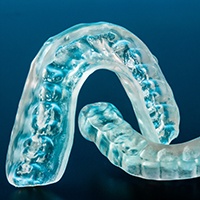 The temporomandibular joints (TMJ) are the small connective tissues that attach the jaw to the skull bone and allow for a complete, comfortable range of jaw movement. Because these small, triangular joints are so delicate, they may be easily strained or damaged. When this damage occurs, the resultant oral health conditions are known as TMJ dysfunction or TMD. For a patient suffering from TMD, we offer a wide range of treatment options to relieve jaw pain and renew full range of motion. Contact our team right away if you experience any jaw pain or diminished movement that may be indicative of TMD.
The temporomandibular joints (TMJ) are the small connective tissues that attach the jaw to the skull bone and allow for a complete, comfortable range of jaw movement. Because these small, triangular joints are so delicate, they may be easily strained or damaged. When this damage occurs, the resultant oral health conditions are known as TMJ dysfunction or TMD. For a patient suffering from TMD, we offer a wide range of treatment options to relieve jaw pain and renew full range of motion. Contact our team right away if you experience any jaw pain or diminished movement that may be indicative of TMD.

Before we begin treatment for patients with TMJ dysfunction, we need to make a complete and accurate diagnosis. We screen for common warning signs of TMD during every six-month checkup, but until it reaches the very advanced stages, these symptoms are often subtle or seem unrelated to the inner workings of your smile. We can use our state-of-the-art 3D CT/cone beam scanner to see just how the jaw and bite are positioned, and we are able to more accurately diagnose TMJ dysfunction even in early stages. Patients should also be aware of the common indications of TMD, and we encourage you to let us know right away if you experience any of the following concerns:

Because the cause of TMJ dysfunction is often difficult to pin point, there may be numerous methods for relieving this painful condition and renewing full jaw movement. We’ll begin by discussing ways to prevent unnecessary strain or damage by changing habits like:
We’ll address each of the above concerns and help patients change their behaviors to avoid TMJ dysfunctions. Additionally, we may encourage patients to perform daily stretching exercises in order to reposition the jaw and relieve pain and inflammation. Orthodontic malalignment is another reason many patients experience TMD. For these patients, we may want to partner with a local orthodontist to correct the positioning of the teeth to prevent continued pain and improve jaw mobility. We will likely also recommend over the counter pain relievers, heating, and or icing to relieve pain and reduce inflammation.

Occlusal splints are custom crafted oral appliances that are worn during sleep. They position the jaw in the ideal resting spot and prevent unnecessary movements. This relieves strain on the jaw joints and prevents further damage. When worn for just a few nights, TMJ sufferers typically see significant pain relief, reduced inflammation, and improved range of motion. As part of an ongoing TMJ therapy plan, wearing custom occlusal splints during sleep can be extremely beneficial to improving overall comfort and function.
So long as you’re undergoing TMJ treatment from a qualified professional, then you should expect the process to be entirely safe. In many cases, the National Institutes of Health highly recommends that you seek to treat TMJ disorder with as minimally invasive and conservative measures as possible. This is why your dentist will often point to other alternatives for treatment before suggesting surgery, which tends to generally come with certain risks. For the most part, treatment options like occlusal splints and equilibration/occlusal adjustments have both been shown to be incredibly safe when treating TMD.
In many cases, occlusal splints for TMJ disorder are typically worn overnight when you go to bed. For most patients, symptoms can begin to diminish rather quickly after some time, but they won’t vanish immediately. It will take time for your TMJ and the places around your jaw to adjust to its new, proper position. Most patients can expect to feel significant improvement after around six weeks, but not complete relief of their symptoms. TMJ splint treatment can take between three and six months to treat TMD discomfort. That said, every person is different, so patients might experience shorter or longer recovery times depending on their specific situations.
TMJ treatment may be covered by medical or dental insurance depending on the root cause of the condition as well as the severity of your symptoms. While the TMJ joint isn’t specifically related to dentistry, many treatment options, like occlusal splints, can only be provided by dental professionals. Coverage from dental insurance plans can sometimes be complex and might vary from policy to policy and between states. Some policies may have clauses that exclude TMJ treatment, so you’ll want to double-check the details of your plan with your provider. Others may limit the dollar amount that can be used on TMJ treatment or the kind of treatment, such as only covering surgical procedures. Just be sure to consult your insurer as well as our team so that you know exactly what can be covered by your plan.
TMJ disorder can sometimes be associated with vertigo and dizziness, which can occur when the TMJ joint is very close to the inner ear. This area has sensors that are critical in balance, eye movements, and equilibrium. To help reduce these symptoms, it’s best to address them by treating the underlying issue, such as treatment that’s designed to reduce inflammation and strain on the joint. You can also try applying a cold compress, eating softer foods, taking OTC pain relievers, and using an occlusal splint to help.